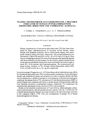 11 citations,
October 1994 in “The Journal of Clinical Endocrinology and Metabolism”
11 citations,
October 1994 in “The Journal of Clinical Endocrinology and Metabolism” Finasteride increases hair growth, prolongs hair cycle, and lowers dihydrotestosterone levels.
 9 citations,
February 2020 in “International Journal of Endocrinology”
9 citations,
February 2020 in “International Journal of Endocrinology” Some men with early hair loss may have a male version of PCOS, affecting hormones and increasing health risks.
 6 citations,
November 1980 in “Clinical Endocrinology”
6 citations,
November 1980 in “Clinical Endocrinology” Measuring plasma testosterone glucosiduronate is a reliable way to detect high male hormone levels in women.

Higher free testosterone levels can increase bone density and decrease body fat but may raise the risk of prostate cancer, hair loss, and benign prostate enlargement.
3 citations,
November 2021 in “Stress” Girls had higher stress hormone levels during school due to social and emotional issues, while boys had higher overall hormone levels with slight changes when school started.
 April 2022 in “International journal of respiratory and pulmonary medicine”
April 2022 in “International journal of respiratory and pulmonary medicine” People with lower levels of free testosterone tend to have worse COVID-19 outcomes.
May 2022 in “Reactions Weekly”  May 2013 in “Journal of the Egyptian Women's Dermatologic Society (Print)”
May 2013 in “Journal of the Egyptian Women's Dermatologic Society (Print)” High aldosterone and free testosterone levels link to female hair loss; testing aldosterone may predict hypertension risk.
21 citations,
January 1999 in “Endocrine” 12 citations,
February 1975 in “Journal of Steroid Biochemistry”  February 2017 in “The Journal of Sexual Medicine”
February 2017 in “The Journal of Sexual Medicine” Long-term testosterone treatment helps men with low testosterone levels lose weight.
 21 citations,
April 2011 in “Physiological Research”
21 citations,
April 2011 in “Physiological Research” Normal levels of DHT can reduce belly fat and increase muscle, but too much can lead to hair loss, prostate issues, and possibly heart disease.
 April 2024 in “JCEM case reports”
April 2024 in “JCEM case reports” A woman's rare benign tumor that released both cortisol and testosterone was successfully removed, improving her health.
September 1978 in “Journal of steroid biochemistry/Journal of Steroid Biochemistry” January 2023 in “Iranian Journal of Pharmaceutical Research” Stauntonia hexaphylla extract can help treat hair loss by blocking certain hormones.
61 citations,
September 1994 in “The Journal of Clinical Endocrinology and Metabolism” 19 citations,
October 1994 in “The Journal of Clinical Endocrinology and Metabolism” 9 citations,
November 1997 in “British Journal of Dermatology”  393 citations,
November 2000 in “Archives of General Psychiatry”
393 citations,
November 2000 in “Archives of General Psychiatry” Testosterone is important for men's sexual function, may help some women's sexual desire, while other hormones and neurotransmitters also play complex roles in sexual behavior.
280 citations,
May 2005 in “Andrology” Testosterone treatment for older men can have short-term benefits, but long-term risks are unclear, requiring careful evaluation and monitoring.
207 citations,
September 2002 in “The Journal of clinical investigation/The journal of clinical investigation” Blocking testosterone speeds up wound healing in males.
184 citations,
January 2000 in “European Urology” Blocking the enzyme that turns testosterone into DHT can safely and effectively treat enlarged prostate.
160 citations,
April 2008 in “Baillière's best practice and research in clinical endocrinology and metabolism/Baillière's best practice & research. Clinical endocrinology & metabolism” DHT in the human prostate is produced through multiple pathways, not just from testosterone.
147 citations,
October 2004 in “Experimental dermatology” Hormones like testosterone affect skin functions and can cause skin issues when in excess; treatments to manage these effects are only somewhat effective.
 147 citations,
April 1990 in “The Journal of Clinical Endocrinology and Metabolism”
147 citations,
April 1990 in “The Journal of Clinical Endocrinology and Metabolism” Finasteride safely lowers DHT levels without affecting testosterone.
 143 citations,
August 1991 in “Endocrinology”
143 citations,
August 1991 in “Endocrinology” Androgens, like testosterone, are crucial for early testicular descent in rats.
142 citations,
February 1985 in “Fertility and sterility” Spironolactone reduced hair thickness and some testosterone levels in women with excessive hair growth.
 135 citations,
March 1984 in “Fertility and sterility”
135 citations,
March 1984 in “Fertility and sterility” Higher levels of unbound testosterone are linked to increased insulin resistance, especially in women with polycystic ovary syndrome.












